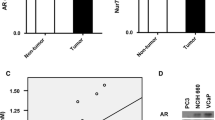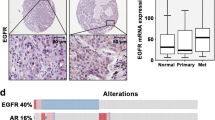Abstract
Purpose
Epidermal growth factor (EGF) and transformation growth factor-α (TGFα) are potent mitogens that regulate proliferation of prostate cancer cells via autocrine and paracrine loops, and promote tumor metastasis. They exert their action through binding to the cell surface receptor, epidermal growth factor receptor (EGFR), and cause activation of Erk1/2 mediated mitogenic signaling in human prostate cancer (PCA) at both advanced and androgen-independent stages. Thus, we rationalized that inhibiting this mitogenic pathway could be useful in controlling advanced PCA growth.
Methods
LNCaP and DU145 human PCA cells were treated with silibinin (100–200 μM) for different time points, and the levels of TGFα, activated signaling molecules (EGFR, Erk1/2 and Jnk1/2) and Erk1/2 kinase activity were analyzed employing ELISA, immunoprecipitation and/or immunoblotting techniques. The mRNA levels of TGFα were analyzed by RT-PCR.
Results
Treatment of cells (LNCaP and DU145) with silibinin resulted in a decrease in TGFα protein at both secreted and cellular levels together with a decrease in its mRNA level. Silibinin also caused an inhibition of EGFR activation followed by that of Erk1/2 without any change in their protein levels. The kinase activity of Erk1/2 to Elk1 was also inhibited by silibinin at least in DU145 cells. In other study, silibinin caused strong inhibition of Jnk1/2 activation in LNCaP cells while in DU145 cells, a strong induction in Jnk1/2 activation was observed. These results suggest that silibinin impairs TGFα-EGFR-Erk1/2 signaling in both androgen-dependent (LNCaP) and -independent (DU145) advanced human prostate carcinoma cells.
Conclusions
This study, for the first time, identifies the inhibitory effect of silibinin on constitutively active TGFα-EGFR autocrine loop in advanced human PCA cells, which plausible contributes to the strong efficacy of silibinin in PCA prevention and intervention, as reported in recent studies.




Similar content being viewed by others
Abbreviations
- EGFR:
-
epidermal growth factor receptor
- Erk:
-
extracellular signal-regulated kinase
- Jnk:
-
c-Jun N-terminal protein kinase
- PCA:
-
prostate cancer
- TGFα:
-
transforming growth factor-α
References
A. Jemal, R. Siegel, E. Ward, T. Murray, J. Xu, and M. J. Thun. Cancer statistics 2007. CA Cancer J. Clin. 57:43–66 (2007).
A. Reed, D. P. Ankerst, B. H. Pollock, I. M. Thompson, and D. J. Parekh. Current age and race adjusted prostate specific antigen threshold values delay diagnosis of high grade prostate cancer. J. Urol. 178:1929–1932 (2007).
L. C. Li. Epigenetics of prostate cancer. Front Biosci. 12:3377–3397 (2007).
R. S. Paul, and N. C. Colleen. Epigenetic mechanisms for progression of prostate cancer. Cancer and Metastasis Rev. 17:401–409 (1998).
A. Tyagi, R. Agarwal, and C. Agarwal. Grape seed extract inhibits EGF-induced and constitutively active mitogenic signaling but activates JNK in human prostate carcinoma DU145 cells: possible role in antiproliferation and apoptosis. Oncogene 22:1302–1316 (2003).
R. P. Singh, and R. Agarwal. Prostate cancer chemoprevention by silibinin: bench to bedside. Mol. Carcinog. 45:436–442 (2006).
R. L. Byrne, H. Leung, and D. E. Neal. Peptide growth factors in the prostate as mediators of stromal epithelial interaction. Br. J. Urol. 77:627–633 (1996).
R. P. Singh, and R. Agarwal. Mechanisms of action of novel agents for prostate cancer chemoprevention. Endocr.-Relat. Cancer 13:751–778 (2006).
M. Kaur, and R. Agarwal. Transcription factors: molecular targets for prostate cancer intervention by phytochemicals. Current Cancer Drug Targets 7:355–367 (2007).
R. Agarwal. Cell signaling and regulators of cell cycle as molecular targets for prostate cancer prevention by dietary agents. Biochem. Pharmacol. 60:1051–1059 (2000).
A. Tyagi, K. Raina, R. P. Singh, M. Gu, C. Agarwal, G. Harrison, L. M. Glode, and R. Agarwal. Chemopreventive effects of silymarin and silibinin on N-butyl-N-(4-hydroxybutyl) nitrosamine induced urinary bladder carcinogenesis in male ICR mice. Mol. Cancer Ther. 6:3248–3255 (2007).
K. Raina, M. J. Blouin, R. P. Singh, N. Majeed, G. Deep, L. Varghese, L. M. Glodé, N. M. Greenberg, D. Hwang, P. Cohen, M. N. Pollak, and R. Agarwal. Dietary feeding of silibinin inhibits prostate tumor growth and progression in transgenic adenocarcinoma of the mouse prostate model. Cancer Res. 67:11083–11091 (2007).
S. Roy, M. Kaur, C. Agarwal, M. Tecklenburg, R. A. Sclafani, and R. Agarwal. p21 and p27 induction by silibinin is essential for its cell cycle arrest effect in prostate carcinoma cells. Mol. Cancer Ther. 6:2696–2707 (2007).
M. Gu, R. P. Singh, S. Dhanalakshmi, C. Agarwal, and R. Agarwal. Silibinin inhibits inflammatory and angiogenic attributes in photocarcinogenesis in SKH-1 hairless mice. Cancer Res. 67:3483–3491 (2007).
M. Kaur, and R. Agarwal. Silymarin and epithelial cancer chemoprevention: how close we are to bedside? Toxicol. Appl. Pharmacol. 224:350–359 (2007).
C. Agarwal, A. Tyagi, M. Kaur, and R. Agarwal. Silibinin inhibits constitutive activation of Stat3, and causes caspase activation and apoptotic death of human prostate carcinoma DU145 cells. Carcinogenesis 28:1463–1470 (2007).
X. Zi, and R. Agarwal. Silibinin decreases prostate-specific antigen with cell growth inhibition via G1 arrest, leading to differentiation of prostate carcinoma cells: implications for prostate cancer intervention. Proc. Natl. Acad. Sci. U. S. A. 96:7490–7495 (1999).
M. Hagan, A. Yacoub, and P. Dent. Ionizing radiation causes a dose-dependent release of transforming growth factor alpha in vitro from irradiated xenografts and during palliative treatment of hormone-refractory prostate carcinoma. Clin. Cancer Res. 10:5724–5731 (2004).
F. Riedel, K. Götte, M. Li, K. Hörmann, and J. R. Grandis. EGFR antisense treatment of human HNSCC cell lines down-regulates VEGF expression and endothelial cell migration. Int. J. Oncol. 21(1):11–16 (2002).
D. W. Cohen, R. Simak, W. R. Fair, J. Melamed, H. I. Scher, and C. Cordon-Cardo. Expression of transforming growth factor-alpha and the epidermal growth factor receptor in human prostate tissues. J. Urol. 152:2120–2124 (1994).
P. J. Roberts, and C. J. Der. Targeting the Raf-MEK-ERK mitogen-activated protein kinase cascade for the treatment of cancer. Oncogene 26:3291–3310 (1994).
N. Bhatia, and R. Agarwal. Detrimental effect of cancer preventive phytochemicals silymarin, genistein and epigallocatechin 3-gallate on epigenetic events in human prostate carcinoma DU145 cells. Prostate 46:98–107 (2001).
T. Qiu, W. E. Grizzle, D. K. Oelschlager, X. Shen, and X. Cao. Control of prostate cell growth: BMP antagonizes androgen mitogenic activity with incorporation of MAPK signals in Smad1. EMBO J. 26:346–357 (2007).
R. Ilagan, J. Pottratz, K. Le, L. L. Zhang, S. G. Wong, R. Ayala, M. Iyer, L. Wu, S. S. Gambhir, and M. Carey. Imaging mitogen-activated protein kinase function in xenograft models of prostate cancer. Cancer Res. 66:10778–10785 (2006).
D. Das, G. Pintucci, and A. Stern. MAPK-dependent expression of p21 (WAF) and p27 (kip1) in PMA-induced differentiation of HL60 cells. FEBS Lett. 472:50–52 (2000).
E. Colomb, P. Berthon, C. Dussert, F. Calvo, and P. M. Martin. Estradiol and EGF requirements for cell-cycle progression of normal human mammary epithelial cells in culture. Int. J. Cancer 49:932–937 (1991).
A. Tyagi, C. Agarwal, and R. Agarwal. The cancer preventive flavonoid silibinin causes hypophosphorylation of Rb/p107 and Rb2/p130 via modulation of cell cycle regulators in human prostate carcinoma DU145 cells. Cell Cycle 1:137–342 (2002).
C. Agarwal, R. P. Singh, S. Dhanalakshmi, A. K. Tyagi, M. Tecklenburg, R. A. Sclafani, and R. Agarwal. Silibinin upregulates the expression of cyclin-dependent kinase inhibitors and causes cell cycle arrest and apoptosis in human colon carcinoma HT-29 cells. Oncogene 22:8271–8282 (2003).
T. W. Flaig, D. L. Gustafson, L. J. Su, J. A. Zirrolli, F. Crighton, G. S. Harrison, A. S. Pierson, R. Agarwal, and L. M. Glodé. A phase I and pharmacokinetic study of silybin-phytosome in prostate cancer patients. Invest. New Drugs 25:139–146 (2007).
R. P. Singh, S. Dhanalakshmi, A. K. Tyagi, D. C. Chan, C. Agarwal, and R. Agarwal. Dietary feeding of silibinin inhibits advance human prostate carcinoma growth in athymic nude mice and increases plasma insulin-like growth factor-binding protein-3 levels. Cancer Res. 62:3063–3069 (2002).
Acknowledgement
This work was supported by the NCI RO1 grant CA102514.
Author information
Authors and Affiliations
Corresponding author
Rights and permissions
About this article
Cite this article
Tyagi, A., Sharma, Y., Agarwal, C. et al. Silibinin Impairs Constitutively Active TGFα-EGFR Autocrine Loop in Advanced Human Prostate Carcinoma Cells. Pharm Res 25, 2143–2150 (2008). https://doi.org/10.1007/s11095-008-9545-z
Received:
Accepted:
Published:
Issue Date:
DOI: https://doi.org/10.1007/s11095-008-9545-z




